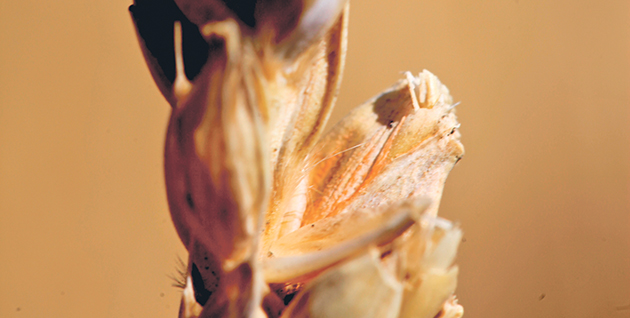
Fusarium’s tell-tale salmon-coloured signs of infection are present across the Prairies. Farmers can manage, but not avoid it. | Michael Raine photo
EDMONTON — Fusarium should be dropped from the Alberta Agricultural Pests Act, say members of the Alberta Wheat Commission.
AWC members plan to lobby the province to amend the legislation, which has been in place since 1999.
By that year, Fusarium graminearum, the culprit in most yield and grade damaging head blights in Western Canada, had made a steady march from Manitoba to a few parts of Alberta.
Read Also

Equipment manufacturing may return to Canada
Some ag equipment and automotive manufacturers are now adjusting their production and distribution to avoid tariff costs in relation to supplying the Canadian market.
In Manitoba and Saskatchewan, farmers saw up to $300 million in annual damages, fewer cropping choices and higher fungicide costs.
As well, reduced value of infected crops, especially in durum, has shifted wheat production and other cereal rotation choices westward.
The 1980s and early ’90s devastated fields of Roblin wheat, Manitoba’s favourite hard red spring variety.
Acres shifted to other cereals as the disease spread west. The droughts of 2002-03 suppressed the advancement and losses, but moist conditions at flowering in 2005 resulted in expansion of the disease in eastern Saskatchewan.
By the mid 1990s, Fusarium graminearum and Fusarium culmorum, the two species that produce the degrading vomitoxin or DON, were showing up as head blights in soft white wheats in central Alberta.
Fusarium avenaceum was also in some samples near Edmonton. However, DON levels were very low, so the disease didn’t pose a significant risk to producers’ crops.
Alberta’s provincial government closed the province to wheat seed from infected regions and made the graminearum species an official pest. This meant that producers and the seed industry were required to take actions to avoid its production and spread.
The act specifies that, “no person shall for propagation purposes acquire, sell, distribute or use any seed, root, tuber or other vegetable material containing a pest.”
By 2009, a wave of wet conditions in southern Alberta caused more widespread infection by both Fusarium graminearum and Fusarium culmorum, with about 10 percent of the hard red spring wheat samples showing signs of the disease.
In 2010-11, grade reductions in some crop districts were again common.
Since then, the disease has shown up in most areas of the province but many crop districts still report limited instances of serious damage.
At the AWC meeting during Farm Tech in Edmonton, producers declared the regulatory war on fusarium over.
Seed samples submitted to testing company 20/20 Seed Labs showed that 70 percent of last fall’s wheat crops in southeastern Alberta displayed signs of infection.
Farmers Will Van Roessel and Gerard Oosterhuis of Bow Island, Alta., put forward a motion to remove the disease from the provincial act.
Producer and seed grower Keith Dagenhardt from Hughenden, Alta., said, “if you are trying to keep the pest out, OK, use best management practices. Seed borne (fusarium graminearum) is a minor cause of spread. Unless we do blanket summerfallow it will be there. It is in the field debris.”
Grower Kevin Bender from the Sylvan Lake area said best management practices must be used by any producer looking to grow wheat profitably. He suggested that access to fusarium free seed is available from outside Alberta and removing the pest from the act will recognize that.
“Growers are going to Saskatchewan to buy seed in cases where there are shortages of local seed available, so we need to make this change,” he said.
While there was opposition, the motion passed and the AWC said it plans to lobby for the removal of the regulation.














